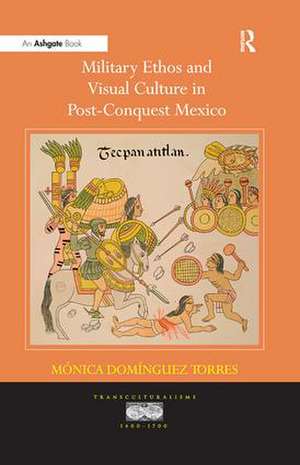Military Ethos and Visual Culture in Post-Conquest Mexico: Transculturalisms, 1400-1700
Autor M�nicaDom�nguez Torresen Limba Engleză Hardback – 28 sep 2013
Din seria Transculturalisms, 1400-1700
-
 Preț: 436.14 lei
Preț: 436.14 lei -
 Preț: 389.66 lei
Preț: 389.66 lei -
 Preț: 389.66 lei
Preț: 389.66 lei -
 Preț: 489.26 lei
Preț: 489.26 lei -
 Preț: 385.74 lei
Preț: 385.74 lei -
 Preț: 389.66 lei
Preț: 389.66 lei -
 Preț: 389.38 lei
Preț: 389.38 lei -
 Preț: 416.22 lei
Preț: 416.22 lei - 22%
 Preț: 324.16 lei
Preț: 324.16 lei -
 Preț: 489.26 lei
Preț: 489.26 lei - 16%
 Preț: 241.15 lei
Preț: 241.15 lei - 18%
 Preț: 1111.40 lei
Preț: 1111.40 lei -
 Preț: 409.48 lei
Preț: 409.48 lei -
 Preț: 389.66 lei
Preț: 389.66 lei -
 Preț: 474.73 lei
Preț: 474.73 lei - 17%
 Preț: 258.70 lei
Preț: 258.70 lei - 26%
 Preț: 847.73 lei
Preț: 847.73 lei -
 Preț: 469.34 lei
Preț: 469.34 lei -
 Preț: 469.34 lei
Preț: 469.34 lei -
 Preț: 498.91 lei
Preț: 498.91 lei - 18%
 Preț: 1117.88 lei
Preț: 1117.88 lei -
 Preț: 449.41 lei
Preț: 449.41 lei -
 Preț: 429.05 lei
Preț: 429.05 lei -
 Preț: 389.38 lei
Preț: 389.38 lei -
 Preț: 411.42 lei
Preț: 411.42 lei - 18%
 Preț: 1054.71 lei
Preț: 1054.71 lei - 26%
 Preț: 821.13 lei
Preț: 821.13 lei -
 Preț: 469.34 lei
Preț: 469.34 lei
Preț: 826.01 lei
Preț vechi: 1106.35 lei
-25% Nou
Puncte Express: 1239
Preț estimativ în valută:
158.07€ • 164.10$ • 131.81£
158.07€ • 164.10$ • 131.81£
Comandă specială
Livrare economică 01-15 martie
Doresc să fiu notificat când acest titlu va fi disponibil:
Se trimite...
Preluare comenzi: 021 569.72.76
Specificații
ISBN-13: 9780754666714
ISBN-10: 0754666719
Pagini: 308
Ilustrații: Includes 8 colour and 68 b&w illustrations
Dimensiuni: 156 x 234 x 24 mm
Greutate: 0.79 kg
Ediția:New ed
Editura: Taylor & Francis
Colecția Routledge
Seria Transculturalisms, 1400-1700
Locul publicării:Oxford, United Kingdom
ISBN-10: 0754666719
Pagini: 308
Ilustrații: Includes 8 colour and 68 b&w illustrations
Dimensiuni: 156 x 234 x 24 mm
Greutate: 0.79 kg
Ediția:New ed
Editura: Taylor & Francis
Colecția Routledge
Seria Transculturalisms, 1400-1700
Locul publicării:Oxford, United Kingdom
Cuprins
Contents: Introduction; Grasping the military ethos of 16th-century Mexico; In the sign of the Cross: the making of new Christian knights; Blazons of Anáhuac and the language of allegiance; The spectacle of war: ancient insignia for the colonial present; Epilogue; Bibliography; Index.
Notă biografică
Mónica Domínguez Torres is an Associate Professor in the Department of Art History at the University of Delaware, USA.
Recenzii
Awarded a Wyeth Foundation for American Art Publication Grant from the College Art Association, 2011
Carefully researched and theoretically sophisticated, this study examines the emergency of new military imagery in the context of competing military ideologies - Spanish and Pre-Columbian - in colonial New Spain. From the creation of new heraldic devices with indigenous elements, to the colonial transformation of European heraldry, ruler portraits in Mexican codices, and military imagery in monastic complexes, as well as the martial symbolism of atrial crosses, Dom�uez's important study documents the fashioning and refashioning of images associated with two different military cultures in an era of conquest. Charlene Villaseñor Black, UCLA, USA
'... this book is well researched, well written, and a welcome contribution. It will surely provoke further discussions about indigenous cultural transitions under Spanish colonialism.' Renaissance Quarterly
'This is a very detailed and carefully researched book, as shown by the very extensive bibliography that concludes it. It paints a fascinating picture of apparently incompatible cultures merging together through a shared system of beliefs in a warrior code. In the process the author also provides much enlightenment on the nature of the martial ethos that existing in each society prior to their joining.' Arquebusier
Carefully researched and theoretically sophisticated, this study examines the emergency of new military imagery in the context of competing military ideologies - Spanish and Pre-Columbian - in colonial New Spain. From the creation of new heraldic devices with indigenous elements, to the colonial transformation of European heraldry, ruler portraits in Mexican codices, and military imagery in monastic complexes, as well as the martial symbolism of atrial crosses, Dom�uez's important study documents the fashioning and refashioning of images associated with two different military cultures in an era of conquest. Charlene Villaseñor Black, UCLA, USA
'... this book is well researched, well written, and a welcome contribution. It will surely provoke further discussions about indigenous cultural transitions under Spanish colonialism.' Renaissance Quarterly
'This is a very detailed and carefully researched book, as shown by the very extensive bibliography that concludes it. It paints a fascinating picture of apparently incompatible cultures merging together through a shared system of beliefs in a warrior code. In the process the author also provides much enlightenment on the nature of the martial ethos that existing in each society prior to their joining.' Arquebusier
Descriere
Bringing to bear her extensive knowledge of the cultures of Renaissance Europe and sixteenth-century Mexico, Mónica Domínguez Torres here investigates the significance of military images and symbols in post-Conquest Mexico. She shows how the 'conquest' in fact involved dynamic exchanges between cultures; and that certain interconnections between martial, social and religious elements resonated with similar intensity among Mesoamericans and Europeans, indeed creating cultural bridges between these diverse communities.
